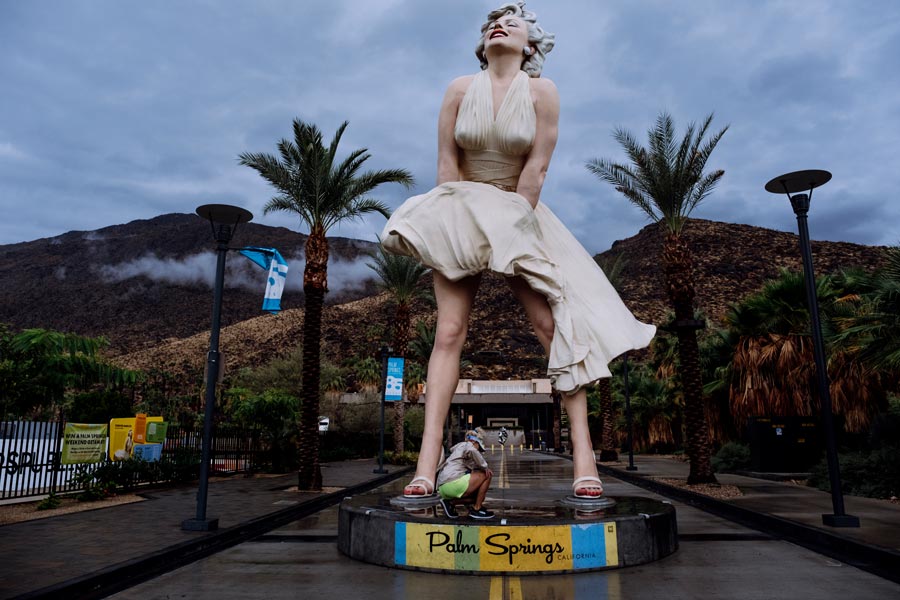It was a sweltering day in Palm Springs, and a few intrepid tourists braved the unforgiving sun to snap selfies at the stilettoed feet of a colossal Marilyn Monroe, her white dress seeming to billow up in the hot dry wind.
Some of them had heard she was not likely to be standing there much longer.
“That’s why we came today — to take pictures,” said Lauri Hatcher, who used to live in Palm Springs and returns each year. “Because it makes me super sad.”
The statue — a 26-foot tall, 17-ton Monroe in her famous subway grate pose from the 1955 movie “The Seven Year Itch” — had bitterly divided the desert city.
While popular with tourists and selfie takers, drawing tens of thousands of visitors a month, the sculpture also met with fierce opposition, and a lawsuit, from foes who saw it as tacky, tasteless and sexist. Some objected that it blocked views of the Palm Springs Art Museum and confronted visitors leaving the museum with Monroe’s exposed underwear.
But now the two sides appear to have settled on a truce. The city’s mayor, Jeffrey Bernstein, told the City Council at a meeting late last month that an agreement had been reached “in principle” to relocate the statue, “Forever Marilyn” by artist Seward Johnson, away from its position on the street in front of the museum to a spot in the adjacent Downtown Park.
The agreement — to be finalized by lawyers within 30 days — promises to bring the drawn-out dispute to a close.
“I don’t think it was a battle worth fighting,” the mayor said in an interview at City Hall. “This only hurts preservation efforts. And I feel strongly about preservation efforts here.”
The sculpture, which had traveled around the country, was purchased in 2021 for $1 million by P.S. Resorts, a hotels committee that promotes tourism. But it drew controversy from the start.
Elizabeth Armstrong, a former director of the museum, in an interview called it “a monument to misogyny” and said that it seemed to invite the practice of “up-skirting,” or taking photos up women’s skirts, which is a crime. “At a time when sexual violence is on the rise, and women continue to be demonized around the globe, this piece is throwback, a relic of sexist, patriarchal attitudes,” she said.
But it has been a hit with tourists. People flock to it to take photos. Shopkeepers at the nearby T-Shirt City say tourists buy postcards and T-shirts featuring the statue. Some ask, in vain so far, for “Forever Marilyn” Christmas ornaments.
“It was immediately embraced by visitors,” said Scott White, president and CEO of Visit Greater Palm Springs, the tourism marketing agency for the Coachella Valley. “She’s been a huge success.”
Opponents argued that it obscures the view of the museum, a brutalist structure designed by E. Stewart Williams, which is on the National Register of Historic Places.
In 2021, a group called the Committee to Relocate Marilyn (Crema), filed a lawsuit against the city and P.S. Resorts arguing that the pedestrian-only street where it had been placed, Museum Way, had been improperly closed to traffic.
“We’ve been working for years to preserve the midcentury modern architecture of Palm Springs,” said Trina Turk, a fashion designer with a store and residence in Palm Springs who spearheaded the opposition, in an interview. “Museum Way was built to provide a view corridor from Palm Canyon Drive, the main thoroughfare, to the entrance to the museum.”
At a City Council meeting July 25, officials announced that they had agreed to move the sculpture, citing a desire to stop spending money on costly litigation.
Peggy Trott, chair of P.S. Resorts, said in an interview that her organization could now “move on and start focusing on funding new events that are going to generate more tourism.”
Adam Lerner, executive director of the Palm Springs Art Museum, praised the outcome. “The museum is thrilled by the City Council’s decision to relocate the statue to the adjacent park,” he said, “where residents and tourists can continue to enjoy it and that will still allow for an unobstructed view of the museum.”
It is not clear precisely where the statue will be relocated. The 1.5-acre park is heavily landscaped with palms and other features.
Some saw the battle as a clash between high and low culture, pitting fans of the popular sculpture against admirers of the art museum and its architecture.
“It’s elitist to tell somebody what they can or cannot like,” actor John Barrowman, who lives in Palm Springs, said in an interview. “Or what is art and what isn’t art.”
Although the conflict seems to be resolved, feelings continue to run high.
“She’s wearing these big white granny panties,” Turk said. Barrowman said: “Trina Turk makes swimsuits that are more revealing than that statue.”
But to some tourists, it is a symbol of the city. “It’s an icon,” said Nick Kampe, a German tourist who had stopped to take photos. “I heard they want to move it somewhere else. I don’t know why.”
The New York Times News Service










